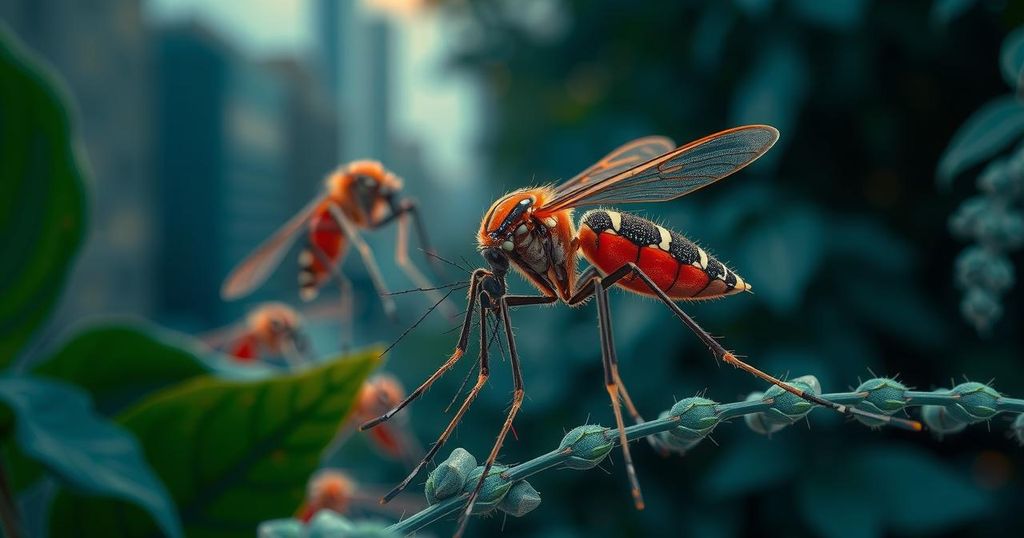Climate change is exacerbating dengue fever transmission, primarily through rising global temperatures that favor the proliferation of the Aedes aegypti mosquito. A recent study highlights that nearly 20% of infections are climate-related, with projections suggesting this may triple by 2050. Increased dengue cases are particularly concerning for regions like Peru and Brazil, while extremely hot areas may see declines in mosquito populations. Comprehensive climate action and mosquito control strategies are necessary to prevent further outbreaks.
The increasing prevalence of dengue fever is profoundly influenced by climate change, which is resulting in rising global temperatures and conducive conditions for the Aedes aegypti mosquito, the primary vector of the disease. A comprehensive study analyzed over 1.5 million dengue cases across 21 nations in Asia and the Americas. It determined that current climate trends could triple the proportion of dengue infections attributable to climate change by the year 2050, unless greenhouse gas emissions are significantly curtailed. The research highlighted that dengue transmission is optimized at a temperature of approximately 84°F (29°C). Regions such as Peru, Mexico, and Brazil are particularly vulnerable, with potential increases in dengue cases exceeding 150% in the forthcoming decades. Conversely, in extreme heat locations such as southern Vietnam, mosquito populations may dwindle when temperatures surpass 86°F (30°C), adversely affecting their lifespan and reproductive capabilities. Moreover, the interrelation between escalating global temperatures and increased international travel is expected to further facilitate the spread of dengue to temperate areas. In light of this troubling trend, experts emphasize the urgency of mitigating climate change as well as enhancing mosquito control methods to reduce incidences of dengue fever. Comprehensive strategies are paramount, which should include reducing carbon emissions to improve climate conditions and implementing essential public health initiatives aimed at controlling mosquito breeding. Urbanization, poverty, and deforestation exacerbate the conditions favorable to mosquito proliferation, especially in locales with inadequate sanitation systems. Successful interventions, such as the introduction of Wolbachia bacteria into mosquito populations, have also demonstrated promise in diminishing dengue transmission in Brazil, though sustained efforts and time are necessary for such initiatives to yield significant results. As the relationship between climate change and public health becomes increasingly evident, it is imperative to integrate dengue control strategies with broader climate change mitigation efforts. Safeguarding vulnerable demographics and fortifying healthcare systems will become vital as temperatures continue to ascend. Furthermore, personal preventive measures such as using insect repellents and wearing appropriate clothing can diminish the risk of infection as dengue cases escalate globally.
Dengue fever, a mosquito-transmitted viral illness, has been exacerbated by climate change, leading to a rise in infection rates worldwide. A significant study has indicated that nearly 20% of all dengue infections can be traced to climate shifts, with warnings that this could increase dramatically by mid-century if proactive measures are not adopted. As temperatures rise, optimal conditions for the Aedes aegypti mosquito develop, resulting in accelerated reproduction and viral proliferation, complicating efforts to control the disease.
In summation, the connection between climate change and the increasing incidence of dengue fever demands urgent attention and action. The research establishes a clear correlation between higher temperatures and the surging transmission of dengue, particularly in tropical regions prone to climate-related changes. Proactive measures, including environmental interventions and public health strategies, are essential to combat the rising threat posed by dengue. Ultimately, integrating climate action with healthcare initiatives is crucial to safeguarding populations from the escalating burden of mosquito-borne diseases such as dengue fever.
Original Source: www.natureworldnews.com







